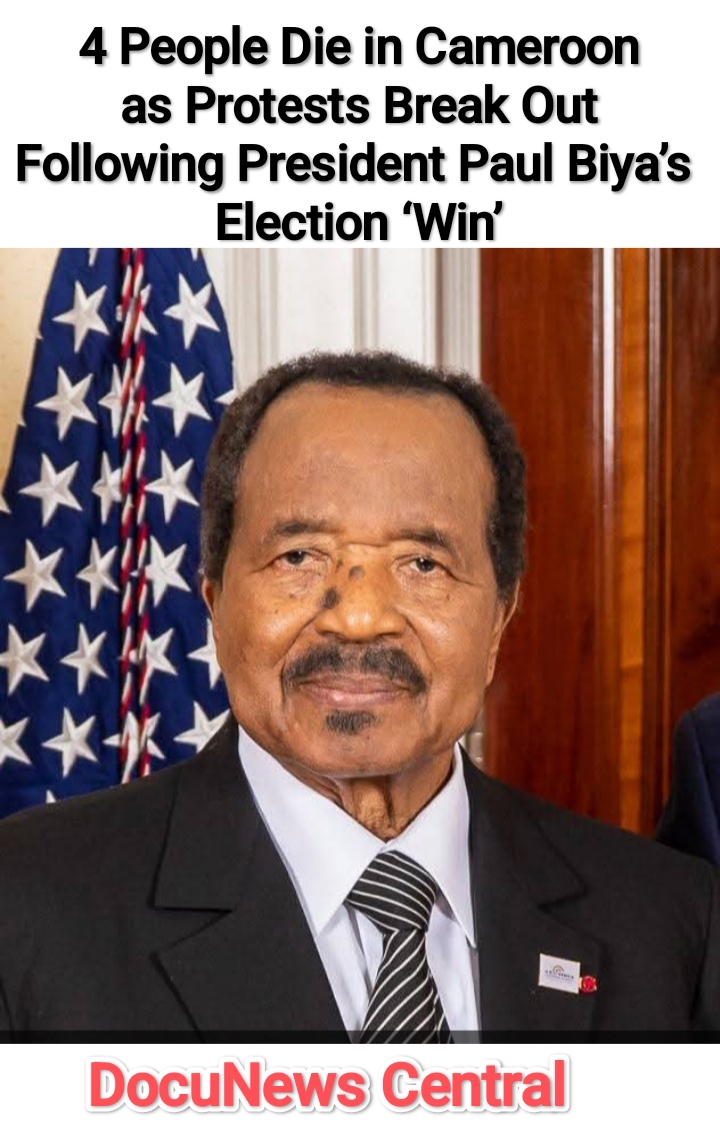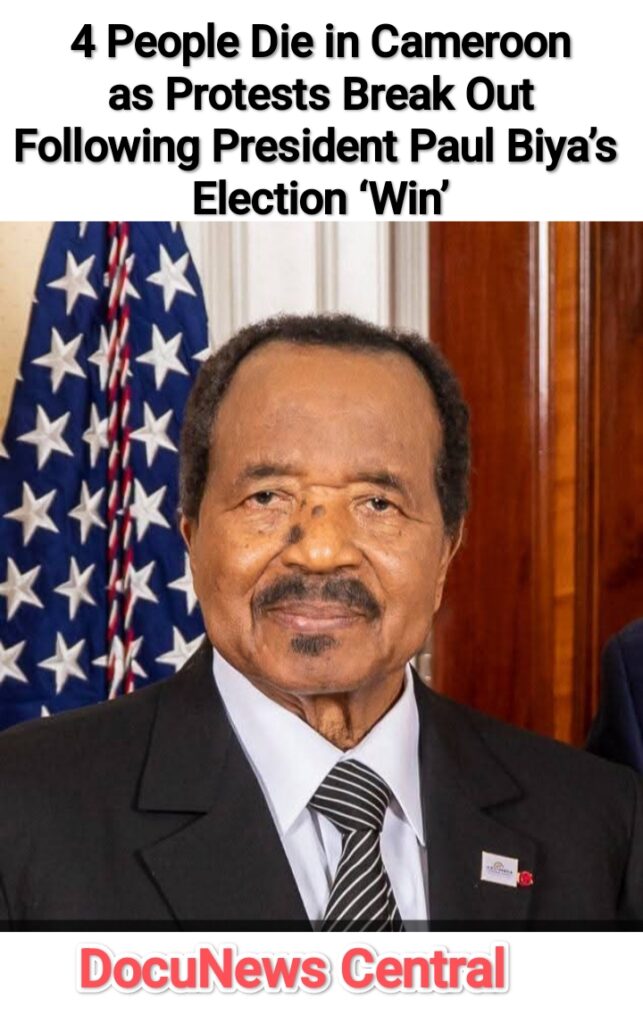

At least four people have died as violent protests erupted across Cameroon after President Paul Biya, 92, was declared winner of the country’s disputed election. Opposition groups rejected the results, sparking unrest in several cities.
What Happened.
Cameroon has once again been thrown into political tension after the country’s long-serving leader, President Paul Biya, was declared winner of the recent election. The 92-year-old, already recognized as the world’s oldest sitting president, reportedly secured his eighth consecutive term in office.
However, what was expected to be a routine announcement quickly turned violent. Protests erupted in key cities including Douala, Garoua, and Yaoundé, with reports confirming that at least four people lost their lives in clashes between demonstrators and security forces.
According to Reuters, the deaths occurred during opposition-led demonstrations challenging the election results. Opposition parties allege widespread irregularities, ballot manipulation, and intimidation, calling the outcome a “democratic tragedy.”
A Controversial Victory for Africa’s Oldest Leader
President Paul Biya has ruled Cameroon since 1982, surviving numerous crises, including civil unrest and separatist movements. His latest re-election, announced by the Cameroon Constitutional Council, gave him 53.66% of the vote, while his closest rival, Issa Tchiroma Bakary, reportedly garnered about 34%.
Although Biya’s government insists the election was “peaceful and transparent,” opposition candidates and observers tell a different story. Reports from The Guardian and France24 describe widespread reports of vote-buying, ballot stuffing, and intimidation by security forces.
For many Cameroonians, this election symbolizes the deep frustration of a population yearning for change after more than four decades under the same leadership.
Protests Erupt Nationwide
Within hours of the official results, thousands of protesters took to the streets of major cities, chanting slogans such as “Enough is enough” and “Biya must go!”
The protests were particularly intense in Douala, the commercial capital, where opposition supporters blocked roads and burned tires. According to eyewitness accounts shared with BBC Africa and Reuters, police responded with tear gas, water cannons, and, in some areas, live ammunition.
“People are tired. We have no jobs, no security, and no freedom to choose our leaders,” said one protester who requested anonymity for safety reasons. “They stole our votes again, and the world must know.”
Security forces, on the other hand, claim that protesters attacked police stations and government offices, prompting what they call a “measured response.” Yet, human rights organizations are calling for an independent investigation into the use of lethal force against civilians.
Four Lives Lost — Conflicting Accounts
According to Reuters, at least four people were killed in Douala during the protests. Local rights groups report that the victims were unarmed demonstrators.
However, the Cameroonian government disputes this version, claiming that some protesters were “violent agitators” allegedly sponsored by opposition groups and foreign agents.
The government’s spokesperson, René Emmanuel Sadi, stated:
“Security forces acted with professionalism to restore order. Unfortunately, some individuals lost their lives in the chaos, but investigations are ongoing to determine the causes.”
Human rights defenders disagree. The Cameroon Human Rights Commission (CHRC) condemned the killings, describing them as “avoidable and excessive.”
The CHRC added that authorities should ensure accountability and uphold citizens’ constitutional rights to peaceful protest.
Opposition Rejects Election Results
The leader of the opposition Alliance for Democratic Change (ADC), Issa Tchiroma Bakary, has rejected the election results outright.
In a statement released on Sunday, Bakary called the election “a complete fraud” and urged the international community not to recognize Biya’s presidency.
“This election was stolen in broad daylight,” he said. “Millions of Cameroonians have been denied their right to choose. We will continue to resist peacefully until our voices are heard.”
Bakary also accused the Electoral Commission (ELECAM) of collaborating with the ruling Cameroon People’s Democratic Movement (CPDM) to manipulate vote counts in several regions.
International observers, including those from the African Union (AU), have expressed concerns about the lack of transparency, though they stopped short of declaring the election invalid.
International Reactions Pour In
The international community has reacted cautiously to the developments in Cameroon.
The United Nations urged restraint and called on all parties to avoid further escalation. The African Union said it was “closely monitoring” the situation and called for dialogue. The European Union released a statement expressing concern about reports of violence and human rights abuses.
France, Cameroon’s former colonial power, reiterated the need for peace and transparency, but stopped short of condemning Biya’s government directly.
The United States Department of State also released a brief statement urging calm:
“We call on the Government of Cameroon to respect the rights of all citizens to peacefully assemble and express their views. We are monitoring reports of violence with concern.”
These responses underscore a recurring pattern: international caution in dealing with long-time African rulers who maintain strong security and diplomatic ties.
Biya’s Enduring Grip on Power
Paul Biya’s continued dominance over Cameroonian politics has baffled many observers.
At 92, he remains one of the most enduring figures in African politics, having survived military coups, economic downturns, and separatist insurgencies in the Anglophone regions.
Biya’s supporters view him as a stabilizing force who has maintained national unity through turbulent decades. His critics, however, see him as a symbol of authoritarian stagnation — a ruler disconnected from the struggles of ordinary citizens.
Many young Cameroonians — more than 70% of the population is under 35 — feel alienated by a government they believe represents the past rather than the future.
A Nation Divided
The election has once again highlighted Cameroon’s deep divisions — politically, ethnically, and linguistically.
The Anglophone crisis, which began in 2016 when English-speaking regions protested marginalization, remains unresolved. Thousands have been displaced, and sporadic fighting continues between separatists and government troops.
Now, with the new wave of post-election protests, analysts fear that Cameroon could slide into deeper instability.
Political analyst Dr. Joseph Nfor told France24:
“Cameroon is at a crossroads. The people are frustrated, and unless the government initiates genuine reforms, we may see another round of violent unrest.”
Government’s Response: Curfews and Internet Restrictions
In the wake of the protests, the Cameroonian government has imposed night-time curfews in several regions, including Douala and Yaoundé.
Reports also indicate that internet access has been restricted in some opposition strongholds — a tactic used previously during election-related crises.
Civil society groups have condemned these measures, describing them as an attempt to silence dissent and control the narrative.
“Shutting down the internet will not bring peace,” said Agnes Nkembe, a digital rights activist. “It only proves that the government fears the truth.”
Humanitarian Concerns Grow
With rising tensions, humanitarian organizations warn of potential displacement and shortages.
Cameroon is already struggling with internal conflicts in its northwest and southwest regions, where separatist militias clash with government troops. The new protests threaten to exacerbate these issues, putting further strain on local communities.
Doctors Without Borders (MSF) has appealed for unrestricted access to affected areas, citing concerns about injuries and medical emergencies during demonstrations.
What Happens Next for Cameroon
The coming weeks will be critical for Cameroon’s stability. Observers say the government has two options: either crack down harder — which risks international backlash — or open the door to inclusive dialogue.
So far, President Biya has shown no sign of stepping down or engaging with opposition demands. His administration insists that “the people have spoken” and that “order will be maintained at all costs.”
But for the average Cameroonian, the question remains: how long can a nation endure under one man’s rule?
Political scientist Dr. Marie Tamo told The Guardian:
“Cameroon’s crisis is not just political; it’s generational. Young people want change, and if the system refuses to evolve, tension will only grow.”
International Media Coverage
Global media outlets continue to follow developments closely.
Reuters has reported continuously on the casualties and protests. The Guardian and BBC Africa have highlighted the generational frustration driving the unrest. France24 and Al Jazeera have aired footage of burning barricades and security crackdowns in Douala.
For ongoing coverage, visit DocuNews Central — your hub for verified global news and fact-checked updates.
Conclusion
Cameroon stands at a historic juncture. The re-election of President Paul Biya has reignited debates about democracy, leadership, and legitimacy in Africa.
While official reports confirm four deaths linked to post-election protests, the true toll may be higher if unrest continues.
Calls for calm and justice grow louder as citizens demand transparency, fairness, and respect for human rights.
Whether the Biya administration will listen remains uncertain — but one thing is clear: Cameroon’s people are no longer silent.






